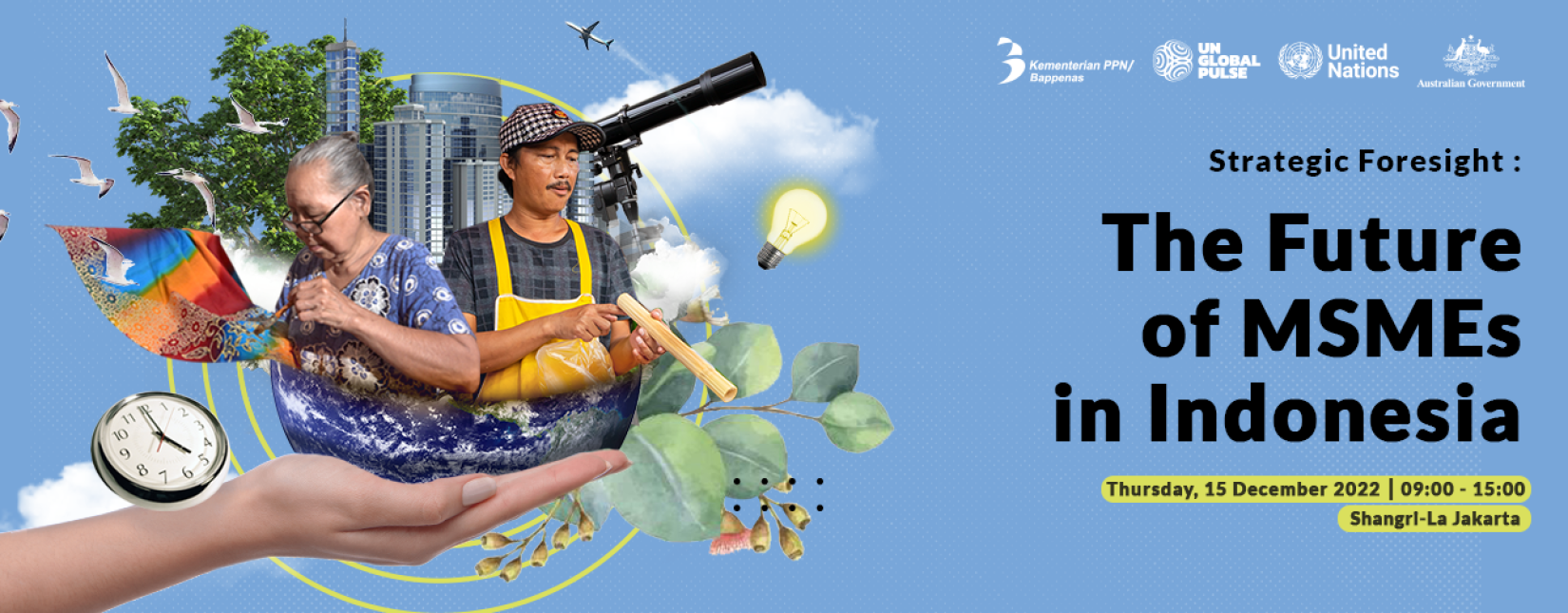Launch of Joint Report by Bappenas and UN Global Pulse: "Strategic Foresight: The Future of MSMEs in Indonesia"
15 December 2022
---

15 Desember 2022, Jakarta — Today the Ministry of National Development Planning/National Development Planning Agency (BAPPENAS) and the United Nations Global Pulse (UNGP) launched a joint report "Strategic Foresight: The Future of MSMEs in Indonesia" in Jakarta. This report, which can be downloaded via the following link, displays the findings from horizon scanning activities carried out to identify new issues that could affect Indonesian MSMEs (Micro, Small and Medium Enterprises) in the future.
MSMEs provide employment opportunities for 97% of the total national workforce or around 117 million workers, of which 64.5% are women. This sector is very important and is often considered the backbone of the Indonesian economy. However, the recent pandemic and global crisis show that MSMEs are very vulnerable to negative shocks. So it is very important for MSMEs to prepare themselves to face rapid changes amidst uncertainty.
Therefore, Bappenas and UNGP through Pulse Lab Jakarta (PLJ) and Pulse Lab Finland (PLF) are collaborating to use strategic foresight methods to help anticipate future possibilities. This foresight method is useful for planning policies and taking action with a long-term and anticipatory approach, which will be useful for ensuring that various scenarios and assumptions that may occur in the future have been integrated into policy making. By using the 'horizon scanning' technique as one of the main foresight instruments, several questions were examined, especially regarding what issues are developing in the sector and what factors can change and disrupt the future of MSMEs as we currently imagine them. After a long process, five main driving factors were identified, namely: climate change, increasing partnerships for a sustainable economy, the emergence of emerging sectors and shifting consumer preferences, engaging technology as a new way of working, and precarious work in the gig economy .
This activity aims to build a common understanding of the importance of anticipatory and forward-looking approaches in policy planning. In his remarks, Secretary of the Ministry of National Development Planning/Main Secretary of Bappenas, Mr. Taufik Hanafi, conveyed the importance of looking to the future and strengthening MSMEs, "Currently the business climate is always changing. The business world, especially MSMEs, is of course also affected by quite extensive changes, starting from production to marketing aspects. We must see this change as an opportunity for MSMEs to be able to change business processes by utilizing digital technology and also carrying out various innovations. "For this reason, we must have the ability to look further into the future, be visionary, and develop and implement preventive strategies to build MSMEs to be more resilient and adaptive."
Head of UN Representative in Indonesia, Ms. Valerie Julliand, also emphasized the importance of strategic foresight. “In order for a policy to be useful [...], it needs to be created in a specific context in which the policy will be implemented. In this case, strategic foresight is useful in realizing anticipatory action and designing policies that are more focused on the future. "The UN will continue to support the Indonesian Government in adapting various innovative methods and helping these methods to be used well to benefit the country and society," he explained.
Through the launch of this report, Bappenas and UNGP invite various stakeholders to discuss the driving factors of the entire MSME ecosystem that have the potential to shape the future landscape of MSMEs in Indonesia, and to build a common understanding of how the use of foresight can support and strengthen policy planning.
For more complete information regarding this report, please visit the page https://pulselabjakarta.org/ourwork/foresight or contact us via plj@un.or.id.
***
About Pulse Lab Jakarta (PLJ)
Pulse Lab Jakarta is a data innovation facility which is an initiative of the United Nations (Global Pulse) and the Government of Indonesia (through the Ministry of National Development Planning, Bappenas). Functioning as an analytical partnership accelerator, Pulse Lab Jakarta applies a combined methods approach using quantitative and qualitative analysis in identifying problems, solutions and identity spaces, also functions as a network catalyst that connects the private sector, government and civil society to support effective development policies and humanitarian responses.





